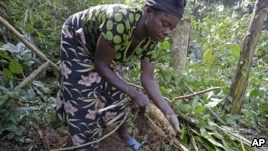(单词翻译:单击)
听力文本
Form VOA learning English, this is the Agriculture report.
Report says farmers in the eastern part of the Democratic Republic of Congo are protecting against crop theft in an unusual way. Aid workers say the farmers are growing crops that are less likely to be stolen.
The United Nations Food and Agriculture Organization regularly talks with farmers in the eastern DRC. It says in the past year, added insecurity has caused many farmers to grow crops they had not grown earlier.
Kwabo Batembo and her four sisters, unseen, clean Casava, a staple food, on the outskirts of the small village of Walikale, Congo, Sept. 18, 2010.
Guillaume Kahomboshi is a food security expert with the FAO in Goma. He says the peasants are struck by the way that wars here always seem to break out at harvest time. They are thinking the wars maybe just an excuse to steal their crops.
Mr Kahomboshi says, many poor farmers are changing the kinds of crops they grow to try to reduce the threat that their crops will be stolen. For example,he knows that most of the people in a territory near Uganda are starting to grow soya.
The territory is called Rutshuru. Mr Kahomboshi suggests this is because soya is not pleasant to eat until it has been dried and milled. He says the armed groups want food that is ready to eat. In addition, there is good demand for soya in Uganda, where it is milled and then used as an ingredient in biscuits and other processed foods.
Kahomboshi tells VOA that farmers in Masisi, another war-stricken territory west of Rutshuru, are switching to growing cassava.
Franck Muke is an agronomist at Goma University. He agrees soya is less likely to be stolen, but he's not so sure about cassava, known as manioc in Congo.
He says cassava is more of a risk because it is a staple food, and he has noticed that although cassava is not easy to pilfer, because it has to be uprooted and then dried and milled, it is often quickly pillaged.
However, the non-governmental organization Concern, which spoke with people in villages affected by ethnic conflict in Masisi, reported less theft of cassava than of other crops.
Years of war and ethnic conflict in parts of eastern Congo have divided communities, this means villagers' crops are as likely to be stolen by their neighbors as by the armed groups.
And that's the Agriculture Report from VOA Learning English, I'm Steve Ember.
文本为51VOA听写整理
译文属可可原创,仅供学习交流使用,未经许可请勿转载
词汇解释
1.soya n. 大豆,[作物] 黄豆
The soya beans have sprouted.
黄豆已经发芽了。
2.mill vi. 乱转;被碾磨 vt. 搅拌;碾磨;磨细;使乱转
The grain was coarsely milled.
谷物粗磨过了。
3.cassava n. 木薯(等于cassawa)
Main grain crop has cassava, taro, corn, banana to wait.
主要粮食作物有木薯、芋头、玉米、芭蕉等。
4.pilfer vi. 偷窃;小偷小摸
Petty pilfering is on the increase in super market.
超市里的小偷小摸现象日见增多。
5.pillage vi. 掠夺;抢劫 vt. 掠夺;抢劫
The Vikings raped and pillaged all along the coast.
北欧海盗沿着海岸大肆奸淫劫掠。
参考译文
这里是美国之音慢速英语农业报道。
报道称,刚果民主共和国东部的农民正在以不同寻常的方式保护作物被盗,援助工人称农民们种植那么不容易被盗的作物。
联合国粮农组织定期和刚果东部的农民谈话,该组织称在去年,不稳定的加剧使得许多农民开始种植之前不种的作物。
Guillaume Kahomboshi是粮农组织驻戈马的粮食安全专家,他说这里的战争总是打乱了收获季节,农民们苦不堪言。他们想,战争或许只是偷盗作物的一个借口。
Kahomboshi说,许多贫困农民正改变所种植作物的种类,来减少被盗的风险。比如,他知道乌干达附近一个地区的很多人开始种黄豆。
这个地区名叫鲁丘鲁,Kahomboshi说,这是因为黄豆在变干和被磨碎之前的口感不好,他说武装组织需要即时可吃的食物。另外,乌干达大量需要黄豆,这里需要磨碎黄豆,拿来作为饼干等加工食品的原料。
Kahomboshi告诉美国之音,在鲁丘鲁西边另一个遭受战争摧残的地区马西西,人们开始种植木薯。
Franck Muke是戈马大学的一名农学家,他也认为黄豆不易被盗,但他不确定木薯的命运。
他说木薯是一种主食,所以风险更大,他还指出,尽管木薯不易被盗,因为必须连根拔出,晒干后磨成粉,所以木薯通常很快就被盗走了。
然而,经常与马西西受种族冲突摧残村庄居民交流的非政府组织Concern报道称,木薯被盗的情况比其他作物要少。
多年的战争和种族冲突使得刚果东部地区的社区已经分裂,这意味着邻居和武装组织一样,都有可能盗取食物。
这里是美国之音慢速英语农业报道,我是斯蒂夫·恩伯。


